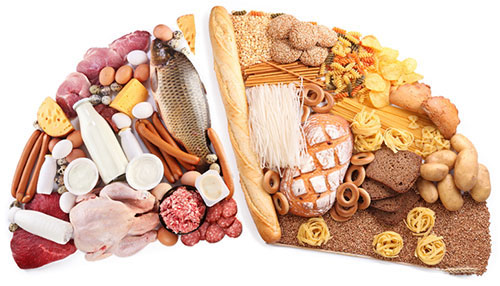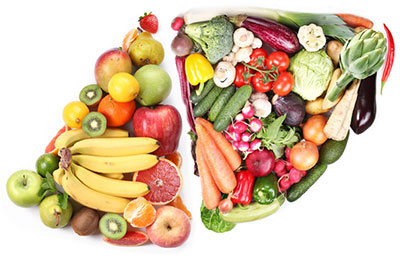Acid vs. Alkaline Foods
The foods we eat are either "acid-forming" or" alkaline-forming" in the body. Whether a food is acid or alkaline-forming depends on the ash that is produced after our bodies have digested it. Just because a food is chemically acid, does not mean that it is an acid-forming in the body. Citrus fruits are a great example of what we think of as acidic foods, but that actually leave an alkaline ash after we digest them. They have an alkalizing effect on the body.
A healthy diet is a balance of predominantly alkaline foods, with a small amount of acidic foods. It does NOT mean that you should avoid acidic foods. It simply means understanding the difference between acidic foods that are good for us, and those that damage our body.
Let's take a look at which foods are alkaline, which are acidic, and learn how to tell the difference between healthy vs. unhealthy acidic foods.
Acid vs. Alkaline vs. Neutral Foods
Acid-forming Foods

This includes animal proteins (meat, poultry, fish, eggs, and dairy), nuts, beans, legumes, most grains, coffee, and alcohol.
Acid-forming foods also include all foods that are fried, cooked at high temperatures, and foods that are heavily processed and refined. Elements in our food that are artificial, such as food chemicals and pesticides, are also acid-forming.
Neutral Foods
Fats and oils have a neutralizing effect on blood acid.
Alkaline-forming Foods

Most fresh, raw, fruits and vegetables are alkaline-forming foods in their natural state (including citrus fruits).
Although alkaline-forming foods are generally low in protein and fat content, raw, sprouted legumes such as lentils, peas, and beans, are a significant source of alkalizing protein.
Our ancestors evolved eating a balanced diet that was very alkaline in nature. However, the standard American diet is highly acidic. By decreasing both the amount of refined foods, high-temperature cooked foods, the amount of animal proteins in our diet, and the dirty dozen, we help bring our body back to a balanced state.
A diet consisting of a large quantity of whole grain carbohydrates will also produce an acidic result if we do not add more alkaline foods such as vegetables and fruits.
Does This Mean Giving Up Acidic Foods?
No! It does not. This is a misconception about an alkalizing diet. In fact, consuming a strictly alkaline diet (which would be extremely difficult to do) is not ideal. Not all acidic foods are bad for you, and many foods found in nature are classed as acidifying. They contain nutrients that are difficult (if not impossible) to obtain from alkalizing foods.
Examples of acidifying foods are walnuts and tomatoes, both acidifying yet wonderful sources of nutrition. Acidic minerals in food include chloride, phosphorus, sulfates, and other organic acids.
MAJORITY
Raw fruits, vegetables, sprouted legumes
MINORITY
Cooked vegetables, nuts, seeds,
cooked legumes, animal protein, organic wine
ELIMINATE
Refined foods, heavily cooked/fried foods,
food chemicals, pesticides, hard alcohol
Achieving a proper balance of acid and alkaline elements in your diet simply means eating more alkaline forming foods than acidic ones, and cutting out unhealthy foods. Balance out the ratio by ensuring that the majority of your plate (at least 75%) is filled with alkaline-forming foods, and the minority (25%), acid-forming foods. For example, a large salad, followed by vegetables with a small piece of chicken, fish, grains, or legumes is a predominantly alkaline meal. Compensate for the acidic foods by eating more highly alkaline foods.
Does This Mean I Have to be a Vegan or Vegetarian?
 Again, no! Not at all. Following an alkaline diet does not require giving up animal products. Almost every traditional cultures either included meat and dairy in their diets, or were semi-vegetarian and included a small portion of animal products (but this was not the pasteurized and hormone/antibiotic/pesticide ridden meat and dairy of today). These included long-lived cultures that reached 100 years of age with little to no chronic disease.
Again, no! Not at all. Following an alkaline diet does not require giving up animal products. Almost every traditional cultures either included meat and dairy in their diets, or were semi-vegetarian and included a small portion of animal products (but this was not the pasteurized and hormone/antibiotic/pesticide ridden meat and dairy of today). These included long-lived cultures that reached 100 years of age with little to no chronic disease.
- Learn more about the diets of traditional cultures
- What are the characteristics of healthy, traditional diets
It is easier for some vegans and vegetarians who have a healthy approach to their diet to achieve a healthy acid/alkaline balance because of the sheer quantity of fresh, whole fruits and vegetables they eat. A healthy vegetarian or vegan diet is naturally lower in the acidifying proteins that are part of a meat eaters diets.
Unfortunately, the highly processed diets of many vegetarians and vegans leads to them being just as acidic as that of a heavy meat-eater. In an effort to replace the meat products, many vegan and vegetarian packaged foods are often highly refined and filled with processed soy and other unhealthy ingredients (not to mention extremely high quantities of fats).
- Vegetarian & Vegan Diets: Doing it right
- Why today's soy is NOT a healthy food product
- The health dangers of today's processed & GM soy
RELATED ARTICLES
- Learn more about the acid/alkaline balance
- How we become overly acidic
- Health consequences of an acidic diet
- Acid vs. alkaline foods
- Acid/alkaline balance & sports performance
- Learn more about acidosis & alkalosis
- The SAD Standard American Diet
- The Dirty Dozen - what they are & how to avoid them
- Get off the diet merry-go-round
- Is your diet healthy?
- How we get sick - how we heal



